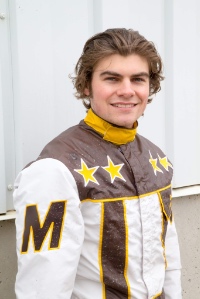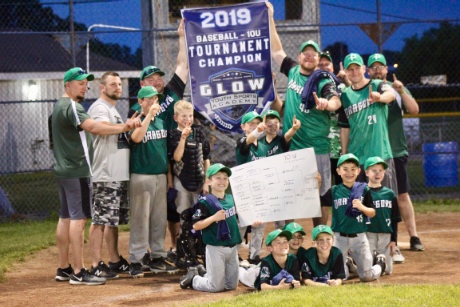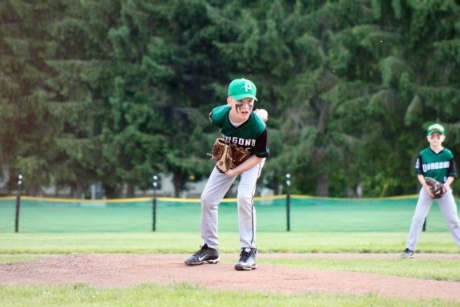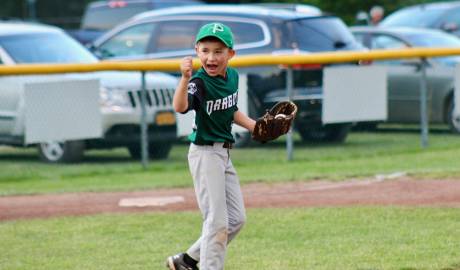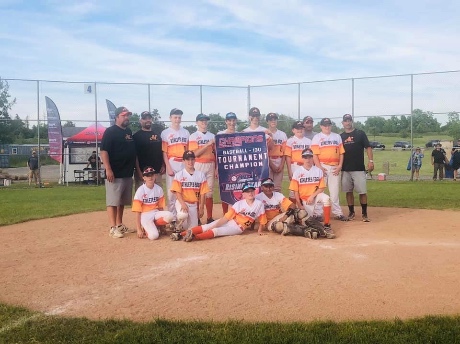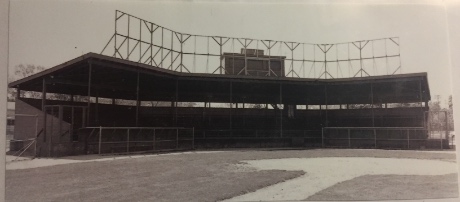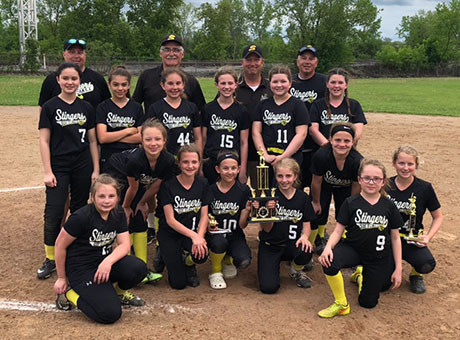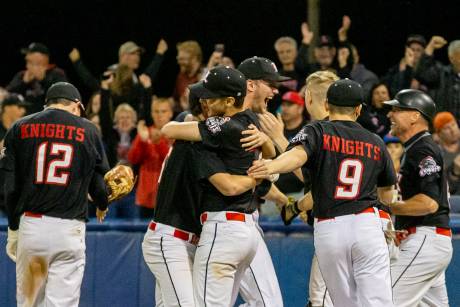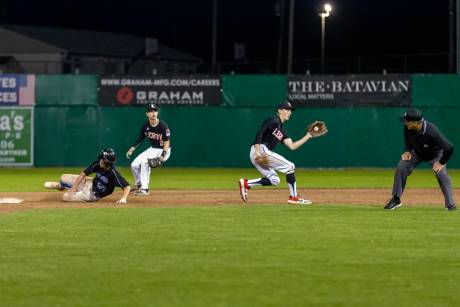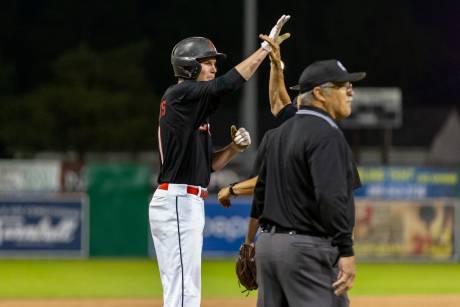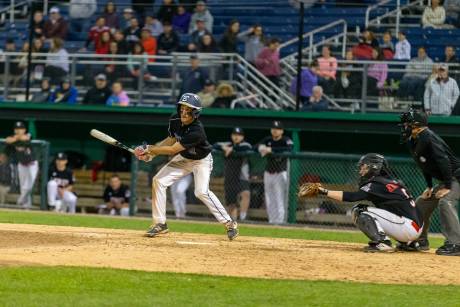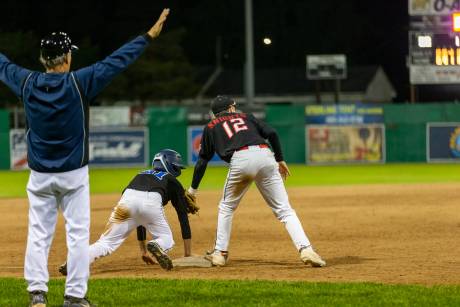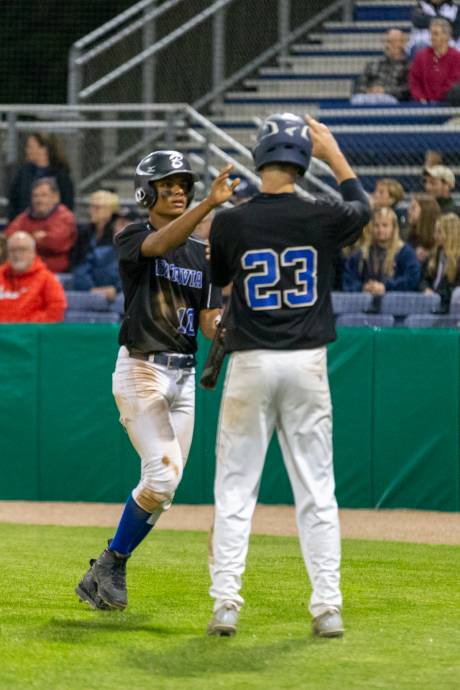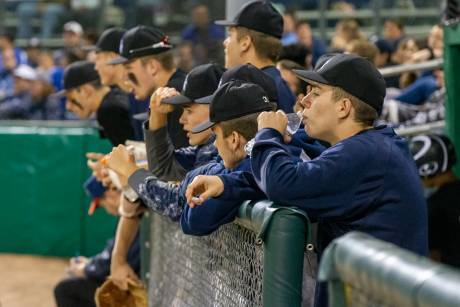(Photo circa 1958. That’s Dave Reilly sliding and his infamous pal Charlie making the "safe" sign.)
This year Batavia will be celebrating 80 years of baseball. Through the names Clippers, Indians, Pirates, Trojans, back to Clippers, and since 1998 the Muckdogs, the local team has provided adults and kids with a source of entertainment during the summer.
It also indirectly affected me ending up in the back of a police car about 60 years ago.
In the late '50s and '60s when I was about 10 to 15 years old (before girls), baseball was king with my friends and me.
In the daytime in the summer we would constantly be on our bikes with our bats and mitts riding all over looking for a place to play ball. One of our favorite places was the Little League park on State Street, which was deserted during the day and another field right by MacArthur Stadium where the Indians (as they were called from '57-'59) played.
We had a group of our guys and there was another ”gang” who lived in the stadium area who we would play for bragging rights.
As long as we were near the Indians' field we would go there when the team was at home and see if we could talk to, get autographs from, or maybe even score a broken bat from our heroes. The “heroes” were in reality 21- or 22-year-olds who had slim chances of getting to the majors, but they were still gods to us.
In 1957 the star was Ken Kraynak, who led the league in batting average, home runs, and runs batted in and thus won the Triple Crown trophy. We had an in with him, too, because for the summer he was dating my buddy Charlie's older sister.
In 1959 the “man” was Al Luplow, who went on to spend nine years in the major leagues. Once again, Charlie stood out but this time for the wrong reason.
Luplow was there in the clubhouse the afternoon Charlie mouthed off to some kid and got his arm broken. Al tried to comfort my friend who was screaming in pain until the ambulance got there. At least Charlie got his cast autographed by most of the players, but he never did learn to keep his yap shut.
When we were younger, 10 to 12 years old, we might have been allowed to walk to the game, but one of our parents would usually pick us up afterward.
Batavia Baseball Bargain -- the 'Knothole Pass'
Also, we would most likely sit in the grandstand section and watch the whole game. We were there for the baseball.
Back then, they had a season ticket for kids called a “Knothole Pass.” It cost one dollar and was good for almost every game. We sure got our money's worth out of that.
I guess the team figured they would make up the money by us kids buying the proverbial peanuts, popcorn and Cracker Jacks. I rarely had any money though, so they lost out on me. Also, I hated Cracker Jacks and still do.
In 1960 Batavia did not field a team due to financial problems. I'm not sure what we did with our summer nights that season, but it probably involved whining at our parents that, “There's nothing to do in this one-horse town.”
However, in 1961 the team returned as the Pirates and we returned as teenagers and some of the shenanigans that come with that wonderful age came with us.
Our parents didn't know it (do they ever?), but now we were likely to spend more time fooling around outside the stadium than in it. Also, we would more apt to be in a group of guys and the monster of peer pressure was lurking around to rear its ugly head.
One of our obsessions was trying to get a foul or home run ball that was hit out of the stadium.
But, in those days, minor league teams had no money to keep replacing expensive baseballs. So, they hired a few teenagers to go get the balls and return them to be used again.
Now, I'm not saying that the team intentionally hired mean bullies for that job, but it sure seemed that way to us younger kids.
The teenagers were faster than us and mostly got to the balls before we could. But, on the few occasions when we actually snagged a foul or homer before them, let's just say that they didn't ask in a polite way to get it back.
We'd usually submit pretty easily, but if not we might go home with dirt on our clothes or a bruise somewhere. I do not recall ever getting to keep one of those baseballs.
Around that time, like many young teens, we began to get daring and try to smoke cigarettes. Of course, even though many of our parents smoked, we'd be in big trouble if they caught us doing it: "Do as I say, not as I do."
Acts of Derring-do
So, we couldn't smoke inside at the game because someone might see us and tell mom and dad. In fact, one time in elementary school I had a candy cigarette (there's a great product for kids) in my mouth outside and by the time I got home, my mom had gotten a call that I had been smoking!
So, if we wanted to sneak a cigarette we'd have to hide outside somewhere. One night, this is what got us into a bunch of trouble.
Behind the center field fence of MacArthur( now Dwyer) Stadium was a stone structure everyone called the Civil Air Patrol Building.
Apparently, during World War II, volunteers used be stationed there with binoculars to keep an eye out for German bombers who wanted to take out the Doehler-Jarvis Tool and Die factory or some other Batavia target.
By 1961 it was pretty much deserted except for men's and ladie's restrooms, which were kept open for people in the park area.
(Author's Note: I was surprised on a recent visit to Batavia to find the old building still standing, albeit in ragged shape and marred by graffiti.)
My friends Charlie (yup, him again), Jay, Mike, and I were in the vicinity of the Civil Air Patrol Building during a Pirates' game. We were most likely once again on a futile mission to get a home run or foul ball.
At some point we went into the men's room to sneak a smoke. We were such chickens to get caught that we even shut the door. But, since the building was really not in use, there were no lights and this is where someone, maybe me, came up with a completely idiotic idea.
Enter Excelsior
In another open but unused room there were some old, cushioned chairs. They had either fallen apart or been vandalized so the stuffing of the cushions was hanging out.
We must have had a good vocabulary because we knew this straw filling was called "excelsior," a word that becomes important in this tale later on.
We took some handfuls of the excelsior back to the men's room, lit it on fire for light, shut the door, and commenced to fire up our Winstons or whatever brand we had.
With no ventilation, within seconds the room filled with dense acrid smoke.
Not wanting to suffocate we had no choice but to throw open the door and exit posthaste while choking and coughing. As we regained our breath the gagging turned to laughter at ourselves as we realized how dumb we had been.
This hilarity did not last long.
We went back inside to stomp out the now smoldering straw, but didn't realize that the plumes had been seen by people inside the stadium at the game.
As we exited again, we looked up to see a Batavia City Police car speeding across the grass toward us. It turned out that a Batavia policeman (who shall remain nameless) had stopped at the game on his patrol and had seen the smoke, too.
What would you do if you were 13 or 14 and saw a police car coming after you? Of course -- RUN!
I'm not sure where the other guys bolted to, but I took off for a huge junkyard nearby. I spotted a rusted out delivery truck and hid inside.
I cowered there trembling like a kitten in a dog kennel. After a few minutes I got up the courage to peek out. There stood the cop with an annoyed look on his face.
“C'mon kid,” he said, “and don't even try running again. Your buddies are in my car already.”
Busted, I hangdoggedly trudged to the cruiser.
Meanwhile, Back at the Police Station...
As we sat in the police car sweating, we asked the officer what was he going to do with us?
“You're going to the station and the desk sergeant can decide how to deal with you,” he replied. “You know you could be charged with arson for setting that straw on fire.”
Then big mistake number two happened.
Someone, and it definitely wasn't me it was Charlie who said, 'It's not straw, it's excelsior.”
“Seltzer?”, the cop asked? “What the heck are you talking about? I know straw when I see it, and I'd advise you to shut up before you get in more trouble than you're already in.”
Charlie eventually became a lawyer, but in this instance he was ruled out of order.
Upon our arrival at the station on School Street, mistake number three occurred. As I exited the police car I tried to throw my pack of smokes underneath it.
They clunked off the side of the car and fell on the street just as the officer turned around.
“Nice try kid,” he snorted as he picked them up.
Once inside, the desk sergeant saw us being herded in and asked the cop, “What were these guys up to?”
“I was at the baseball game and saw smoke coming out of the Civil Air Patrol Building," he reported. “I drove out there and these kids had been in there smoking cigarettes and set a bunch of straw on fire. They ran, but I got 'em,” he announced proudly.
“What have you guys got to say for yourselves?”, the sergeant asked.
Remember, Charlie couldn't keep his yap shut. With aplomb, he unbelievably inserted his foot into his mouth yet again: “Well sir, we were smoking but it was just a little fire. And it wasn't straw, it was excelsior.”
Wow. Fresh blood might be redder than the first cop's face, but that's doubtful.
Perp Walk for Rare Company
Mercifully, we did not get charged with arson. Our parents were called and had to come pick us up.
My parents almost never had company, but on this night a group of people were at our house and I had to do the perp walk through them to my parents' embarrassment.
For the next month my mother had me scrubbing walls, pulling weeds, and generally working from morning until night.
And Charlie's fate? His parents promptly enrolled him in military school in Syracuse instead of returning to Notre Dame.
It was questionable as punishment though; he went on to become a Captain and got to carry a sword around. It also served to add to his already big ego.
All of us had to go with our parents to see the Batavia Police Youth Officer Lewis Snell.
I'm not sure what admonitions he gave or what advice he might have given for our future, but it must have worked on some level because that turned out to be my last time in the back of a police car.
Unless I really go off my old guy wheels, I'm pretty sure things will remain that way, too.
Photos courtesy of Dave Reilly.
Below, Batavia's minor league baseball field as it was when Dave Reilly was a boy, circa 1958.
Below, the old Civil Air Patrol Building as it stands today; the site of the excelsior escapade.

